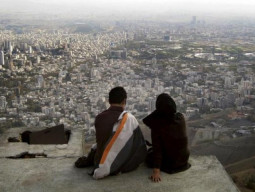
The seismic transition from the papal theo-centricism to the anthropo-centricism of Renaissance, and from the Biblical geo-centricism to the Copernican helio-centricism ushered in the revolutionary and iconoclastic spirit of Modernism. In Modernism, the individual spirit was valued higher than any collectivist endeavour.
However, man’s honeymoon with modernism was soon over when heavy industrialisation and corporatisation of human effort verged on inhumanism against the humanism of Renaissance. The exploitation of human individual effort caused in man the insecurity and uncertainty of the fruit of his toiling ending up with the futility of his effort for his self-preservation.
The myth of Sisyphus defines the zeitgeist of post-modernism that hinges on man’s ontological struggle. The never-ending consuming individual struggle for existential survival is considered the antipodal backlash of the “self-consciousness” of modernism.
When the individual effort was subjugated to industrialised and capitalistic collective output of the bourgeoisie, all human effort concerted on personal security. Personal security is deemed as the mortals’ chiefest enemy in the sense that the more man ventures to attain individual security via individualistic designs, the more precarious his social existence becomes – it all reverses human journey towards civilisation. Allama Iqbal also alluded towards the futility of individualistic effort in his poetry:
Fard qaaim rabt-e millat se hey tanha kuchh nahi/ Mauj hey darya mein aur bairoon-e darya kuchh nahi
Parochialism opens highways and byways to monetary and moral corruption that tolls the bell for human society as a sustaining entity. The Quaid-e-Azam categorised the hierarchy of priorities to ward off the solipsistic powers: “Our duty to the state comes first: our duty to our province, to our district, to our town and to our village and ourselves comes next.”
In the comity of nations, Israel epitomises self-delusional self-preservation. Its experience of the Holocaust has made it irascible of its existence that it becomes insular to all the qualms of conscience, and callous to humanitarian calls in its recent genocide of the Palestinians – reminiscent of Shylock’s “a pound of flesh” in Shakespeare’s The Merchant of Venice, and of the revenge of Christopher Marlowe’s Barabas, the Jewish merchant in The Jew of Malta. “When will our consciences grow so tender that we will act to prevent human misery rather than avenge it,” says Eleaner Roosevelt.
In the contemporary political landscape, vested interests are cloaked in nationalism, social engineering or pan-democritisation. America’s war on “weapons of mass destruction” in Iraq exposed American weapons of mass deception – the alleged manoeuvrings to bring democracy in the targeted lands.
Similarly, the US invasion of Afghanistan and jeopardising the sovereignty of Pakistan borders to counter Taliban materialise the pyrrhic victory of the US hegemonic designs and meddling machinations. Noam Chomsky has described the US invasion of Afghanistan as “one of the most immoral acts in modern history”. He says, “States are not moral agents.”
One must differentiate between the individual effort for one’s vested interest and the effort as a contributing factor to the greater good. The former is parochial and self-serving while the latter, patriotic and altruistic.
To be obsessed with one’s ulterior motives is tantamount to transacting a Faustian bargain with the Mephistopheles: trading one’s soul for diabolical favours. In extreme cases, this can result in a culture of entitlement, narcissism and moral disengagement, where empathy and altruism are sidelined in favour of self-gratification.
In Pakistan, demagogues and ideologues play with public opinion through social and ideological engineering under the individualistic pursuit of their ulterior interests which range from their intoxication of power to the self-aggrandising dreams of setting up a holy state.
Published in The Express Tribune, April 22nd, 2024.
Like Opinion & Editorial on Facebook, follow @ETOpEd on Twitter to receive all updates on all our daily pieces.







































COMMENTS
Comments are moderated and generally will be posted if they are on-topic and not abusive.
For more information, please see our Comments FAQ